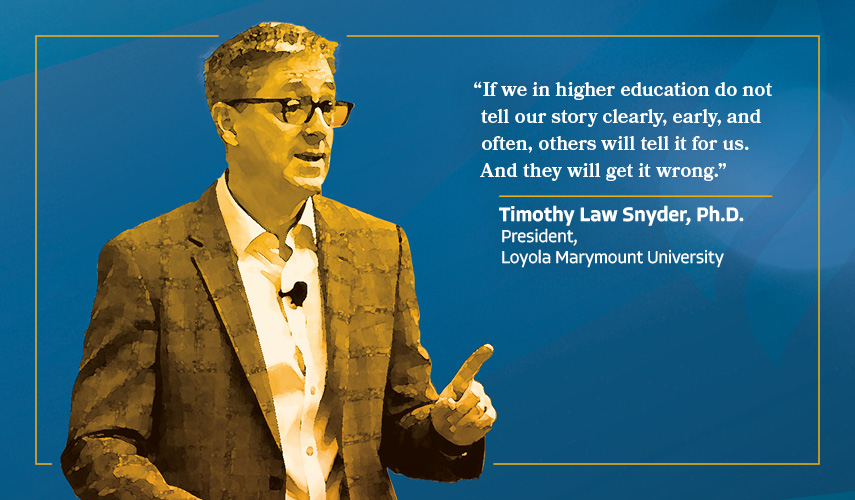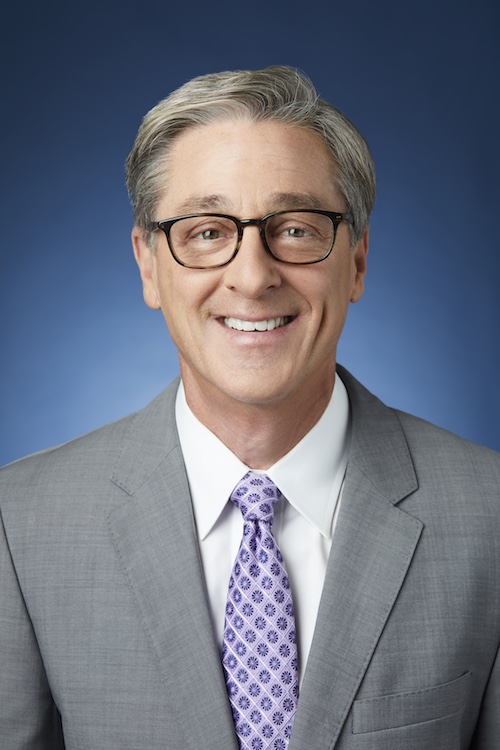
Thought Leadership
Leading with Conviction in an Age of Distrust
In an age where truth feels negotiable and trust in institutions grows thin, I return to a guiding conviction: if we in higher education do not tell our story clearly, early, and often, others will tell it for us. And they will get it wrong.
We live in a time when the value of education is questioned, our motives doubted, and our relevance challenged. This is not the first era in which power and wealth have eyed education as fertile territory for control, but it is one of the most urgent moments to affirm who we are — not just what we do, but also why we do it.
As president of Loyola Marymount University for the past decade, I’ve seen this truth unfold: higher education is not failing — we are failing to tell our story. We’ve let others define us by fabricated stories and by metrics that miss the heart of our mission. In that vacuum, suspicion has grown. But at its core, higher education remains one of humanity’s greatest endeavors — an act of love, of hope, and of faith in each other and in the future.
If we in higher education do not tell our story clearly, early, and often, others will tell it for us. And they will get it wrong.

By Timothy Law Snyder, Ph.D.,
President
Loyola Marymount University
Reclaiming Our Story
Our role is to prepare minds to navigate the world’s complexities. We are born to learn, to communicate, to uplift. What a privilege to be part of this sacred work. And yet, we have grown oddly hesitant in sharing that truth.
Too often, we’ve relied on slogans and statements, assuming trust where it no longer exists. It’s time to return to authentic storytelling — joyful, meaningful, and true.
That story begins with creativity. Our challenges are more complex than ever, and creativity is no longer a luxury; it is essential. And creativity thrives on diversity: the richer the variety of perspectives, the bolder the ideas born, and the broader our impact.
Abstraction, this is not. This is truth — felt, lived, undeniable. Diversity fuels innovation, and inclusion ensures that every voice has a place at the table. Equity builds bridges that connect potential with participation. Contrary to a current false narrative, when we widen the circle, we don’t dilute excellence, we elevate it.
But let us not reduce diversity to a spreadsheet of checkboxes. We are not collectors of difference for the sake of difference. We are talking about human beings, each born of immutable dignity, each reflecting the image and likeness of God. In our Catholic tradition, this is not only a moral imperative — it is a calling.
I am troubled by how public discourse has twisted this noble pursuit. Diversity is too often framed narrowly as a justice issue, alone. Justice matters deeply, and justice suffices to compel us toward greater diversity — but diversity is also a driver of innovation, a path to understanding, and essential to our shared future. This has been true not just during humankind’s time, but in all that preceded us, as the evolution of life has demonstrated.
At LMU, we see this in our transfer partnerships with over 50 community colleges. These pathways welcome brilliant, determined students who might not have had the means to begin at a four-year institution. Financial aid often paves the final mile toward us. When we extend that bridge, we don’t just change one life — we change generations.
The Solidarity Generation
This mission extends to our students — what I call the Solidarity Generation (listen to my SXSW EDU talk “Courageous Leadership for and with the Solidarity Generation”). Some label them Gen Z, but I prefer a term that reflects their sociocultural spirit. Born into climate crisis, social upheaval, school violence, and political fatigue, they see solidarity as their core asset.
They care deeply about the planet, about justice, and about safety. But they are weary of our public rhetoric. They want action, partnership, and authenticity. They don’t need us to preach; they want us to walk alongside them in shared purpose.
That doesn’t mean surrendering our wisdom — instead, it means sharing it with humility. The Solidarities look to us for guidance, for frameworks, and for the lessons that only experience can offer. And we must meet them where they are — learning with them, leading beside them.
Leadership today demands courage and humility: courage to speak when necessary, humility to know when silence serves better. We must resist reacting to every controversy that hits our desk, especially with blathersome statements that seem to rain down from on high, with our positions on what we stand for — instead of what we do and why — proclaimed like the trumpets of Jericho. Not everything requires a statement; some moments call for presence, patience, pause, and deep listening. Our words carry weight — let’s employ them wisely.
Staying the Course
We must also resist the temptation of short-term fixes. We’ve seen this before: massive online open courses (MOOCs) were going to replace us, as outlined by the Thomas Friedmans and David Brookses of the world. They didn’t. Disruption is rarely extinction — rather, it is evolution. Stay the course. Be creative in how we adapt, but unwavering in why we do what we do.
The stakes are too high to lead from fear. Build trust, empower your teams, and let them take risks. When they thrive, the institution moves forward.
Anchored in Purpose
I draw strength from prayer, from colleagues, and from quiet, everyday acts of love — like a barista writing on my cup, “I tried to put the sun in here, but it was too hot.” This is a small reminder that warmth lives in the details.
As I prepare to pass the torch to my successor on June 1, I find myself reflecting not on endings, but on continuities — the lasting power of mission, the enduring call to serve, the joy of walking alongside generations of Lions.
Above all, I find strength in the enduring belief that what we do matters. We are not merely preparing students for jobs. We are preparing them for lives of purpose, for citizenship, and for care of our common home.
This is the story we must tell.
And we must tell it with conviction.

